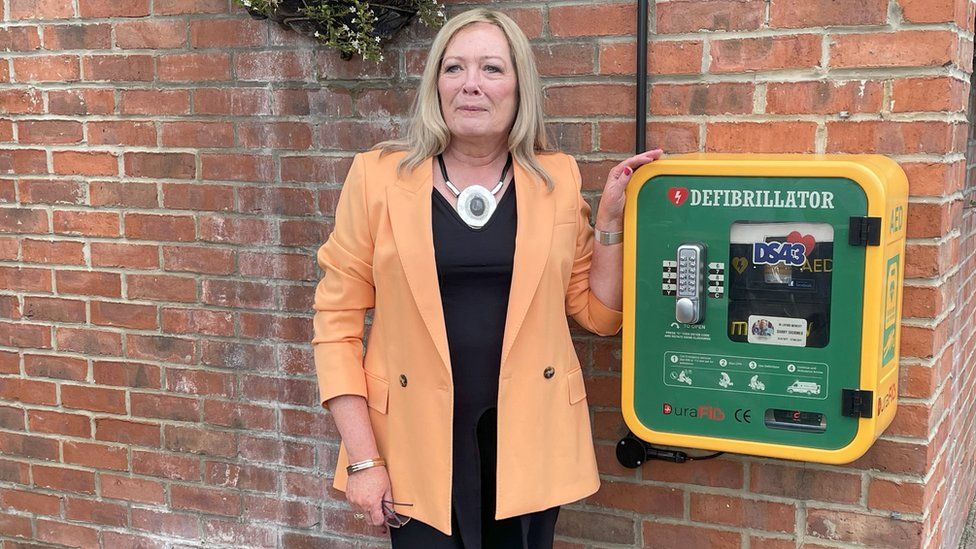ARTICLE AD BOX
 Image source, BHF
Image source, BHF
Pam Shurmer is campaigning for better access to public defibrillators at all times of the day and night in her home town
People living in more deprived areas of England and Scotland live further away from an accessible defibrillator than those in wealthier areas, a study in Heart journal suggests.
Heart experts are calling for equal and quick access to the life-saving machines at all times of day and night.
They are used - alongside resuscitation or CPR - to give the best chance of survival after a cardiac arrest.
But in the poorest areas, the nearest machine is a round trip of 1.8km away.
Three out of 10 cardiac arrests happen at weekends and four in 10 happen during the night, so quick access to a defibrillator at any time of the day is crucial, the study says.
And every minute of delay between a cardiac arrest and defibrillation reduces the chance of survival by up to 10%.
Automated external defibrillators (AEDs) can be used by anyone, without training, in the event of someone's heart stopping or beating abnormally outside of a hospital, although people are advised to call 999 first.
The device checks the heart rhythm and gives a high-energy shock to the heart to restore normal rhythm, but only if needed - you can't shock someone accidentally.
However, not everyone has equal access to an automated external defibrillator, and some cannot be used outside of working hours - if they are located in a school, community hall or supermarket, for example.
How to use a defibrillator and save a life
This study found that in England and Wales, the distance to the nearest defibrillator is shorter for poorer communities, with no apparent difference between rich and poor areas in Scotland.
But when it looked at defibrillators that are accessible 24 hours a day, it found the difference in distance to the nearest device in poorer parts of England compared to the richest, was 99m. In Scotland, the gap was even wider - 317m further away for the people in a poorer neighbourhood.
On average, a public access defibrillator is 726m away from the centre of any given postcode along the road network across Great Britain, the study said.
The research used locations of AEDs which had been collated by the British Heart Foundation in 2022 using information from ambulance services, organisations and individuals across the UK. If you're a defibrillator guardian, you can register your defibrillator on The Circuit website.
Image source, BHF
Image caption,Danny Shurmer died aged 43 after having a cardiac arrest
Dr Chris Wilkinson, study author and senior lecturer in cardiology at Hull York Medical School, said: "Making existing defibrillators accessible to the public 24/7 would make a big difference to the average distances people need to travel in an out-of-hours emergency, and would improve equality of access - which can help save lives."
Pam and Bill Shurmer, from Hartlepool, lost their son Danny, 43, when he had a cardiac arrest in 2021.
"I would never want any parent to go through the loss that we went through," Pam said, explaining that Danny had no previous health issues and was a talented sportsman.
They set up a charity called DS43 Community Defibrillators, which raises money to put the devices in public and accessible places across their home town. They want everyone in Hartlepool to be within a 350m radius of their nearest defibrillator.
Pam, who is also involved in the research, said it highlighted how unequal the access is: "Hopefully this leads to better access to these life-saving devices."
St John Ambulance said recent research suggests 47% of people don't know where to find their nearest defibrillator.
"These devices are simple and easy to use, and everyone should have equal access to them," said Adam Greenwood, community engagement manager.
"Our community advocates do great work supporting people locally by helping them identify where their nearest devices are and equipping them with the confidence to use one in an emergency," he added.
"But I'd urge everyone to keep themselves and loved ones safe by learning lifesaving skills, so you could help save a life one day."
Across the UK each year, ambulances are sent out to 30,000 people who have had a cardiac arrest outside of hospital, but the survival rate is only one in 10.
Related Internet Links
The BBC is not responsible for the content of external sites.

 1 year ago
25
1 year ago
25








 English (US) ·
English (US) ·